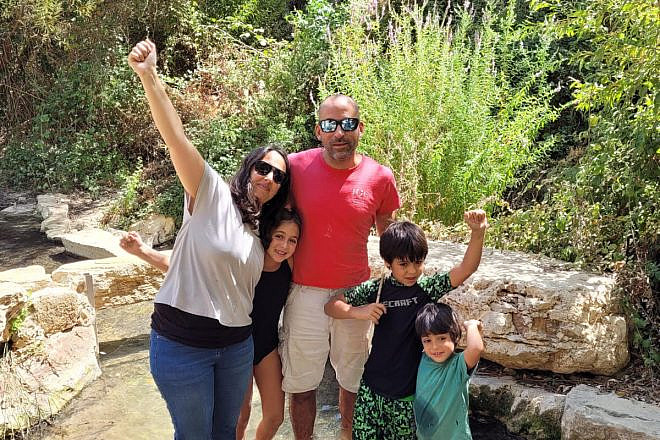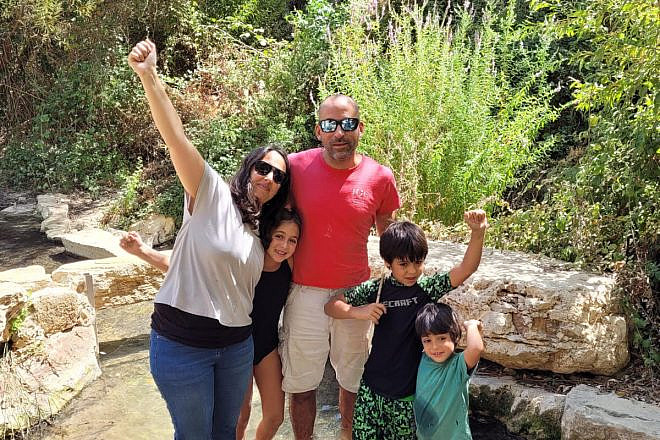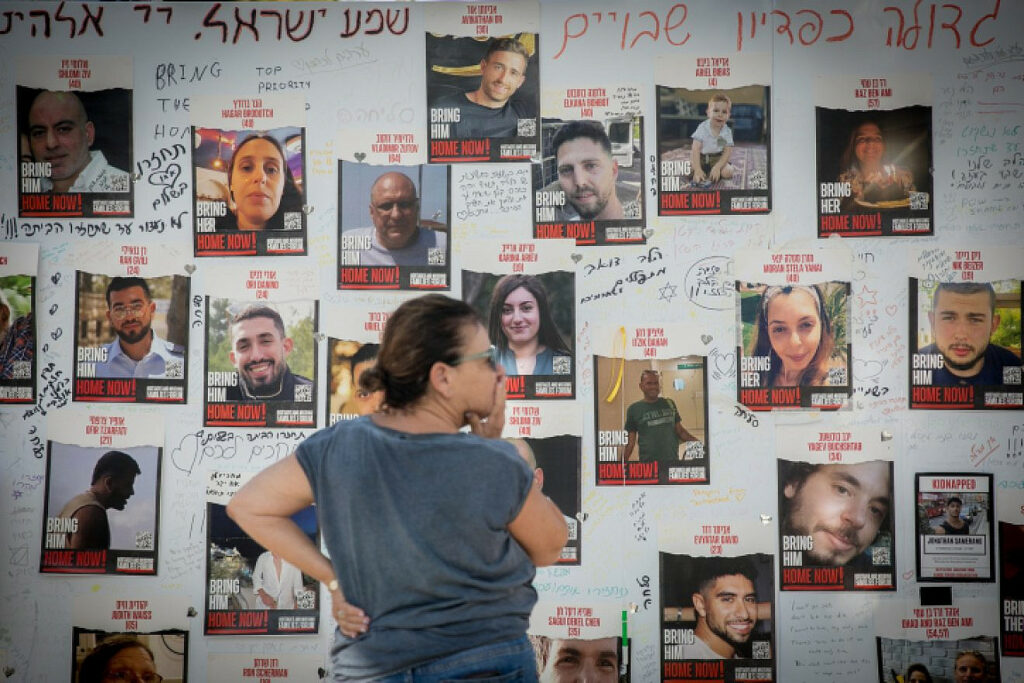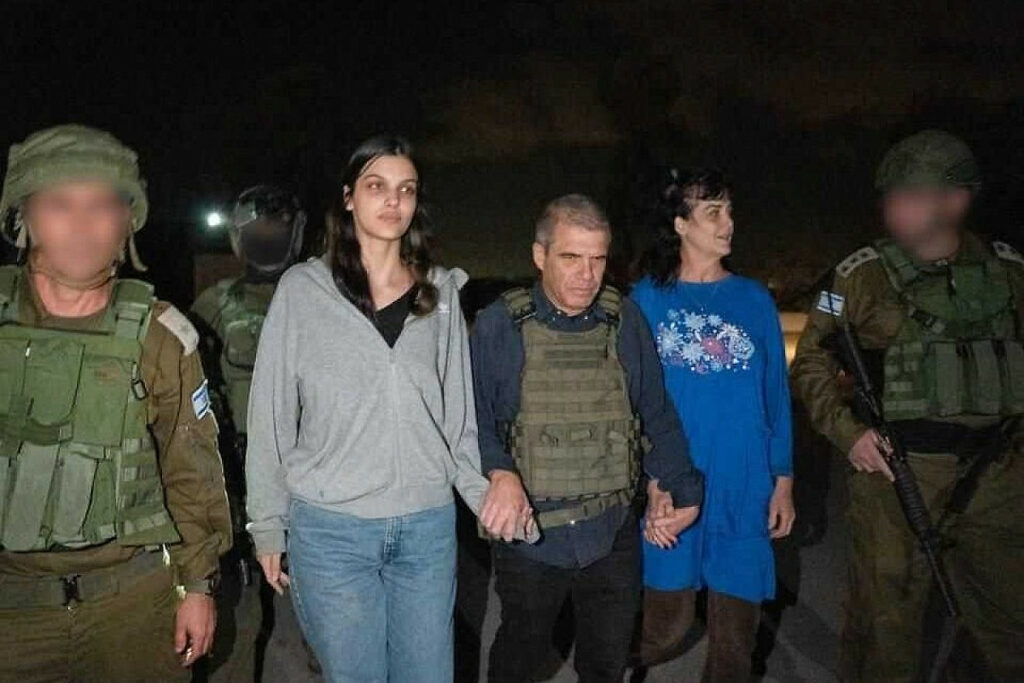
‘My Family is in Gaza’
Avihai Brodutch’s wife Hagar and three young children, Ofri, Yuval and Uriah were taken by Hamas terrorists from their home in Kibbutz Kfar Aza, and he has had no word from them since.
“Every minute is a nightmare,” said Avihai Brodutch, “and too much time has gone by.”
It has been one month now since Brodutch last saw his wife and three young children, aged 10, 8 and 4, who were kidnapped from their home in southern Israel by Hamas terrorists and brought to Gaza.
It has been one month of sleepless nights and anguished days.
The image in his mind of his three kids, Ofri, Yuval and Uriah—who are among the 32 Israeli children held by the Palestinian terrorist organization in Gaza since the Oct. 7 attack—do not give him rest.
“They’re kids,” he said in an interview with JNS on Tuesday. “They haven’t done anything to anybody.”
A family birthday followed by horror
A day before the attack, the Brodutch family had just celebrated his oldest daughter’s tenth birthday at their home in Kibbutz Kfar Aza, located just 2 miles from the Gaza Strip. “The presents are still on the table,” he noted.
Even when the air-raid sirens sounded that fateful Saturday morning, the family were not overly concerned, having become accustomed to years of rocket attacks from Gaza, he said. That all changed when they got word that terrorists had also broken into their farming community and were going on a rampage, in a scene of horror that played out simultaneously in more than two dozen locations in the area.

A neighbor’s child, a friend of his daughter’s, suddenly appeared at their house, all bloodied. Her parents had been killed.
After securing his family and the girl in their sealed room, Brodutch, 42, went outside to see what he could do to help.
He kept in touch with his wife, Hagar, by text message, each reassuring the other that they were OK.
But at 11 a.m. when he texted her to ask how she was doing, she texted back: “Someone is coming in.” That was the last contact he had with his wife and children.
Fearing the worst
Brodutch initially assumed that his family was dead. He would soon learn that they—along with about 240 other people in various communities—had been taken to Gaza as hostages. There were no signs of violence visible in the safe room of their house. However, his initial joy and relief upon learning they were probably alive were quickly followed by weeks of anguish and increasing despair.
The nightmare begins
In the first days after the attack, said Brodutch, he was in a daze, unable to grasp what had happened to his family. In those early days, he believed that the hostages would be returned quickly.
“Every day I thought they would be released today; then I thought tomorrow and then I thought by Friday ahead of the weekend,” he said, speaking on the lawn of the hotel in central Israel to which he and other evacuees from the Gaza border communities have been relocated.
A week passed. The family’s dog, Rodney, who was outside at the time of the attack, was found. A small ray of hope—but still no news of his family.

One-man protest
Unable to sleep, Brodutch went to a psychiatrist, who gave him some medication. He woke up, dizzy, at 2:00 a.m.
“I didn’t know what to do with myself,” he said, ”so I made a simple sign.” The sign read: “My family is in Gaza.” In the wee hours of the night, his brother drove him and the dog to the Defense Ministry headquarters in Tel Aviv, where they sat outside, sign in hand.
Police came and asked him if he could move, the darkness covering the words on the sign.
“No”, he responded.
“Why not?” they asked him.
“My family is in Gaza.”
The officers hugged him and said he could do whatever he wanted. By morning, thousands of Israelis would pass by and show their support. Every day since, he has remained there with his sign. In the late afternoons and evenings, he tells his family story to the media, with a lifelong friend and a team of volunteers helping him and the other families of hostages with the logistics. Uncertainty hangs in the air.
Mounting frustration and fear
As the days wore on, Brodutch, an agronomist studying to be a nurse, said he felt increasingly exasperated by the fact that the government was not doing enough to release the hostages, which, he insisted, had to be the number one priority of any Israeli mission in Gaza. Then, as two American hostages were freed, followed by two elderly Israeli women, and an Israeli army rescue operation brought home a female IDF soldier, he felt that the message had gone through.

“Children shouldn’t be part of any conflict, any children,” he said, watching a video of his kids on his phone, tears welling in his eyes.
He recollects his wife’s French pastries; his daughter’s love of British music, his son the center-back at soccer and his youngest’s love of riding her tractor in the dirt.
Unimaginable
The unity of the people in Israel in the wake of the war strengthens him, as do the messages of solidarity from both world Jewry, foreigners and even Muslims abroad, he said.
“I never in my life imagined that Jewish children would be kidnapped from their homes,” he said. “For 80 years [since the Holocaust] it didn’t happen, and now it has happened again in the State of Israel. The government failed to prevent this second Holocaust, and for over month now this second Holocaust is continuing on my children and on all the hostages.”
The post ‘My Family is in Gaza’ appeared first on Israel365 News.
Israel in the News